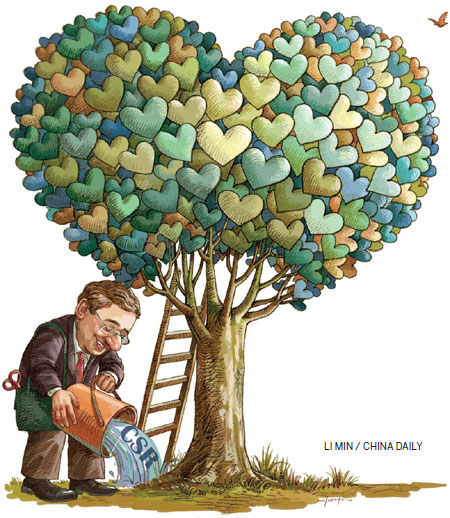
Multinationals pump prime business plans with more community outreach programs
Corporate social responsibility has long been a buzzword in the boardrooms of the West, but it is relatively obscure in China. But as China becomes more important to multinational companies in generating revenue, they are stepping up their corporate social responsibility efforts in the country.
In part, this is spurred by the desire to create positive brand recognition and a need to counteract the growing environmental concerns surrounding Chinese manufacturing.
"Multinational companies want to be seen to be doing the right stuff and they want to be seen to be making a positive contribution," Richard Welford, chairman and founder of CSR Asia, told China Daily during a recent corporate social responsibility summit in Beijing.
"It is probably even more important (in China) to have that trusting relation, particularly with the government."
Used to describe anything from donating money to charities to changing the way a company packages a product so as not to harm the environment, CSR is a far-reaching term.
Though it broadly falls into three main categories - community outreach, environmental health and safety and environmental protection - the bulk of CSR work consists of designing a more sustainable company culture or having employees engage in volunteer work, making the exact value of CSR difficult to gauge.
"It's very difficult to put an actual number on (CSR). It rather depends on what type of company you are, what type of industry you are in," Welford says.
"The bigger brands will spend more on CSR as they have big brands to safeguard."
Right choice
But despite the term's ambiguity, large multinationals seem to see the value in being perceived as "doing the right thing", with many companies in China dedicating 1 percent of their entire operating costs to CSR work - something that is also becoming an industry standard.
Though the percentage looks small, the monetary value is sizable.
For Coca-Cola, one of the largest multinational companies in China, 1 percent of the operating costs used for CSR work in 2011 meant that the company spent nearly $102 million (79 million euros) globally through the Coca-Cola Foundation.
"So far the government and NGOs are doing most of the heavy lifting when it comes to sustainability, while businesses are playing more of a supporting role," says Aurora Chen, director of sustainability for Coca-Cola in China. "Going forward we need to bring these three together, each doing what they do best, all working as one. This way can create real impact that none could achieve alone."
While the benefit of such a large investment may be difficult to calculate on paper, a 2011 survey by the Reputation Institution, a global management consultancy service, reckoned that CSR activities account for 40 percent of a company's reputation.
Early on in China's manufacturing boom, most sustainability efforts by large companies came from foreign brands looking to ensure that their suppliers were meeting their values and global standards.
In 1991, Levi Strauss & Co was the first multinational apparel company that required its manufacturing suppliers to follow a supplier code of conduct that detailed the company's global labor, health, safety and environmental requirements. The popular American blue-jean maker was one of the first to require its Chinese factories to engage in better labor standards.
"Our terms of engagement raised the bar for the apparel industry in setting labor, health, safety and environmental standards for our suppliers," said a Levi Strauss & Co spokesperson. "We expect our suppliers to treat their employees with dignity, respect and fairness and to provide safe and healthy workplaces."
